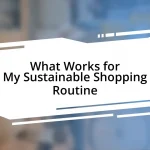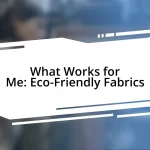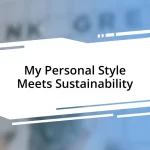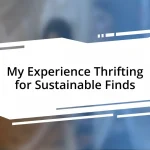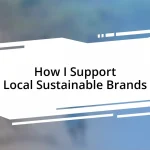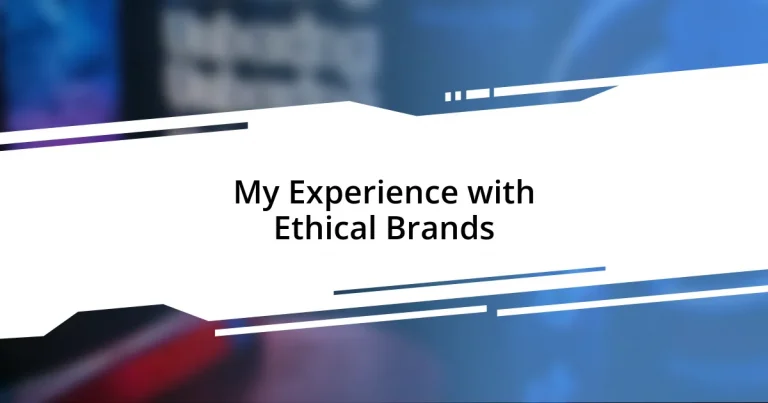Key takeaways:
- Choosing ethical brands fosters a connection with personal values and contributes to social responsibility.
- Research and transparency in brand practices are essential for building trust and making informed purchasing decisions.
- Shopping for ethical products involves checking certifications and understanding the brand’s impact on communities and the environment.
- Engaging in conversations with brand representatives can enhance understanding and deepen commitment to ethical consumption.
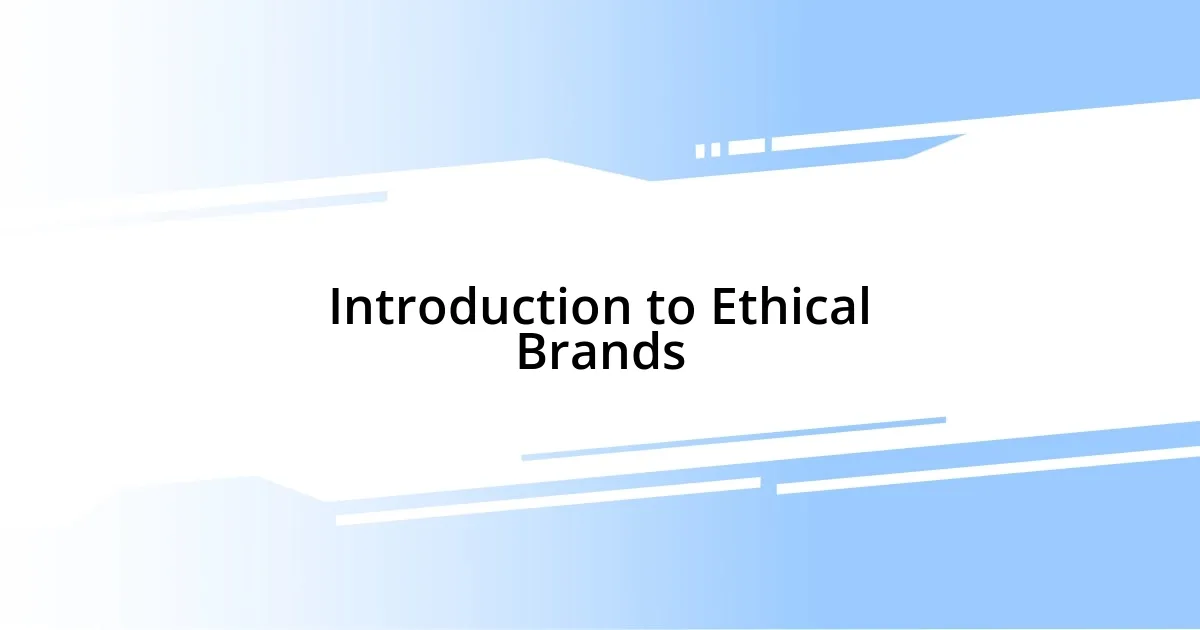
Introduction to Ethical Brands
Ethical brands represent a growing movement in the consumer marketplace, prioritizing social responsibility alongside profit. I remember the first time I consciously chose an ethical brand for a clothing purchase; it felt empowering to support a company that aligned with my values. Have you ever considered how your buying choices impact the world?
When I explore ethical brands, I often feel a deeper connection to the products I choose. For example, I recently discovered a skincare line that sources its ingredients sustainably and doesn’t test on animals. It’s not just about looking good; it’s about feeling good knowing that the brand’s principles resonate with my own.
The beauty of ethical brands lies in their commitment to transparency and positive impact. Each time I see a label that reflects fair labor practices or eco-friendly materials, I can’t help but smile, knowing that my purchase contributes to a better world. Isn’t it reassuring to think that our choices can spark meaningful change?

Personal Journey Towards Ethical Choices
When I first dipped my toes into the world of ethical brands, I felt a mix of excitement and uncertainty. I distinctly remember browsing a local market, spotting a small, independent brand that created handcrafted bags from recycled materials. It was one of those moments where my heart raced a bit—could I really make a more conscious choice? I took the plunge and bought one, a decision that made me feel like I was part of something bigger.
Over time, my choices evolved as I became more aware of the impact my purchases had on various communities and the environment. I began to actively research brands, diving into their backstories and sustainability practices. I stumbled upon a fair-trade coffee company whose commitment to farmers caught my attention. Every sip of their brew felt like a warm connection not just to the flavors but to the stories of those who crafted it. It transformed my morning ritual into a moment of gratitude and awareness.
Reflecting on this journey, I’m amazed at how prioritizing ethical brands has enriched my life. It’s not just about the products; it’s about aligning my values with my shopping habits. This shift has sparked conversations with friends and family, encouraging them to consider the broader implications of their choices as well. Isn’t it fascinating how our personal journeys can inspire those around us?
| Ethical Choices | Impact |
|---|---|
| Purchasing from local artisans | Supports small businesses and local economy |
| Choosing sustainable fashion | Reduces environmental footprint |
| Prioritizing fair-trade products | Empowers marginalized communities |
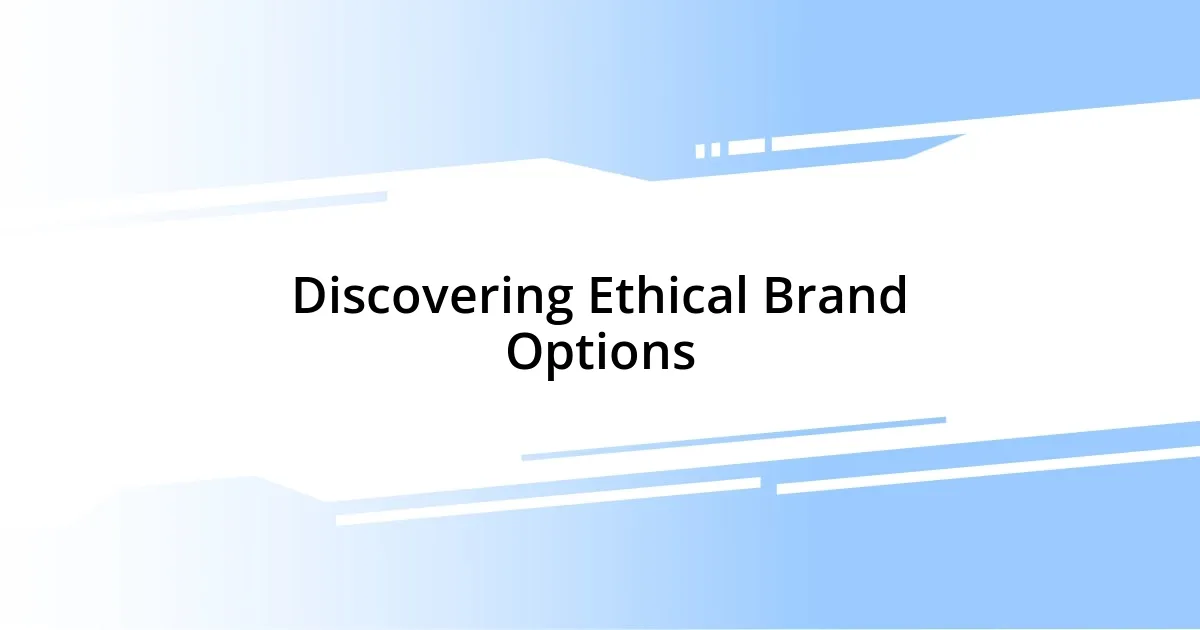
Discovering Ethical Brand Options
As I navigated the sea of ethical brands, it became clear that the journey often leads to delightful surprises. I remember when I stumbled upon a brand that specializes in eco-friendly cleaning products. I was skeptical at first, thinking they couldn’t possibly match the effectiveness of traditional cleaners. But after trying their all-natural formula, I was genuinely impressed! Not only did my home smell fresh, but I also felt a sense of pride knowing that I was reducing my chemical footprint.
To find ethical brands that resonate with me, I’ve developed a little routine. Here are some steps I take:
- Research Online: I often start with social media and review sites to discover brands that prioritize sustainability.
- Visit Local Markets: I love exploring farmer’s markets; these are treasure troves for local and ethical options.
- Join Communities: Engaging in online forums or local groups centered around ethical consumption can unveil hidden gems.
- Check Certifications: I ensure brands have certifications like Fair Trade, B Corp, or GOTS (Global Organic Textile Standard) for credibility.
Each discovery not only enhances my shopping experience but deepens my commitment to making choices that reflect my values. Isn’t it rewarding to know that our curiosity can lead us to better choices?
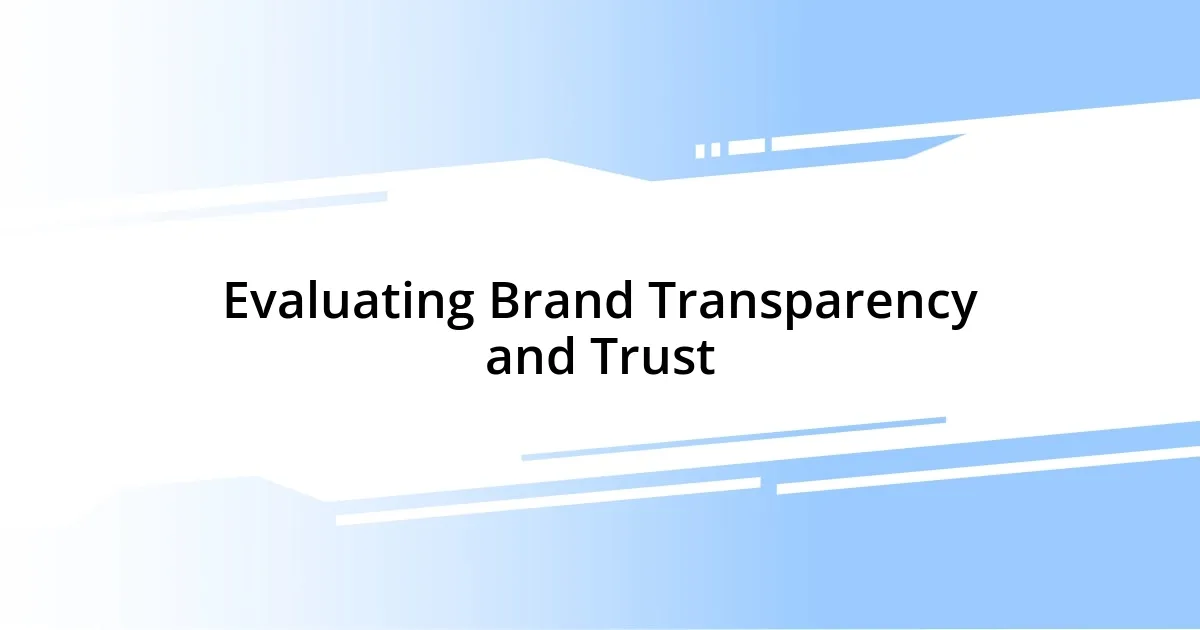
Evaluating Brand Transparency and Trust
Evaluating transparency in ethical brands can sometimes feel like a puzzle. I remember when I first encountered a clothing company that boasted about its sustainable practices but offered vague details about their supply chain. I found myself asking, “What does sustainable really mean in this context?” Digging deeper, I soon realized that specific information about sourcing and labor practices was crucial for building my trust in the brand.
One day, I decided to reach out to a skincare brand that proudly claimed to be cruelty-free and eco-friendly. To my surprise, the founder responded to my inquiry personally, sharing insights into their sourcing and production process. That level of openness felt refreshing and authentic. It solidified my trust and made me feel like I was part of their story, not just a customer. It’s amazing how a simple conversation can significantly deepen your connection to a brand.
Yet, not all brands provide such clarity. I’ve come across several that rely heavily on marketing buzzwords without substantial backing. It leaves me thinking: if a brand can’t transparently communicate its values, what are they really hiding? I’ve learned that trust requires a commitment to honesty and genuine practices. As consumers, we must ask these critical questions, knowing that our choices can support brands that truly align with our ethical ideals.
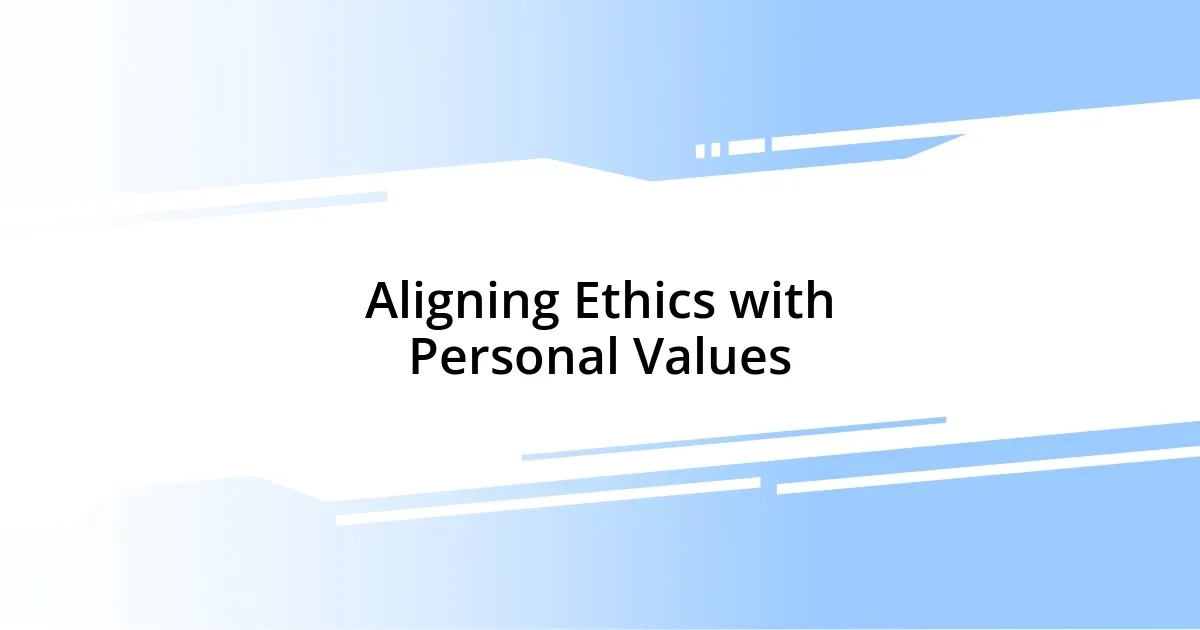
Aligning Ethics with Personal Values
Aligning my ethics with personal values is a dance of sorts. I recall a moment when I was choosing between two brands for a pair of shoes. One was a well-known fast-fashion label, while the other was a smaller company focusing on fair labor and sustainable materials. After looking into their missions, I realized that supporting the latter not only felt right but aligned closely with my commitment to ethical practices. That decision left me feeling validated and proud as a consumer.
There are times when I feel torn between convenience and my values—doesn’t everyone? I vividly remember when I needed a last-minute gift and found a conventional store only to be confronted by my hesitations about supporting brands that don’t prioritize sustainability. I knew that purchasing from ethical brands might mean spending a bit more time searching but the joy in finding something truly meaningful outweighs that inconvenience. Each moment has only strengthened my resolve to align my choices with my ethics.
The more I connect with brands that reflect my values, the more empowered I feel in my consumer journey. I often think about the ripple effects of these choices; when I supported a brand that invests in community development, I not only felt a sense of connection but also an emotional investment in their mission. Isn’t it fascinating how these choices can transcend just being a transaction? They create a narrative where my purchases contribute to a greater purpose, reaffirming my belief in the positive impact of ethical consumption.
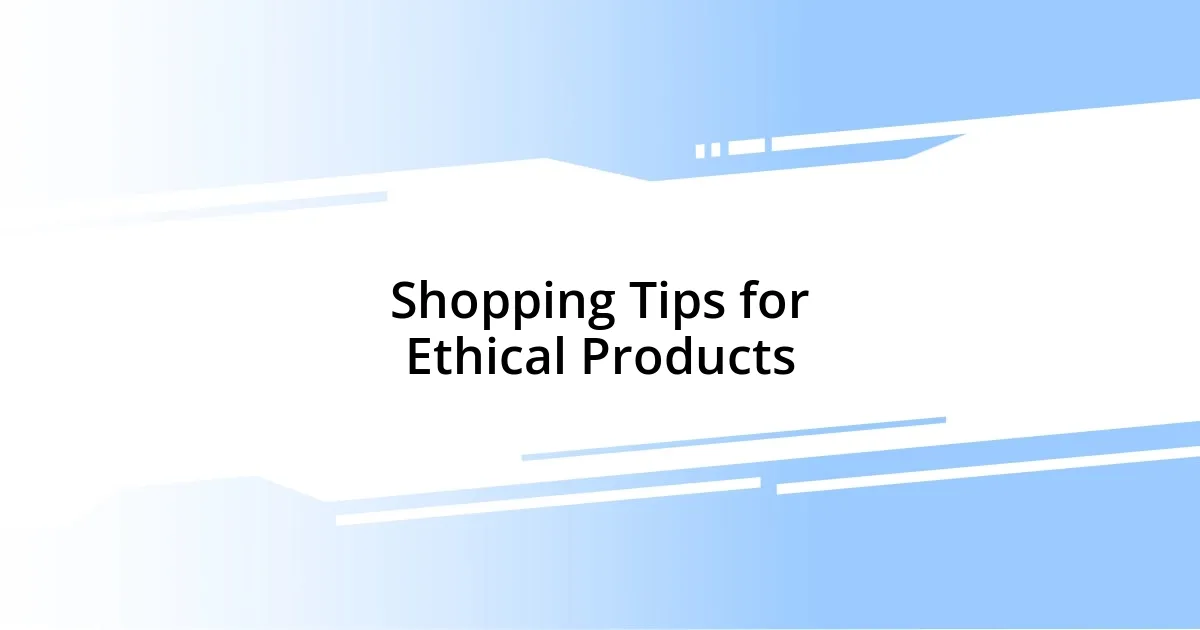
Shopping Tips for Ethical Products
When I’m shopping for ethical products, I always start by checking labels and certifications. The first time I spotted a “Fair Trade” logo on my coffee package, I felt a rush of excitement. It was a small detail, but it offered a sense of reassurance that the farmers were treated fairly. I often ask myself, how much would I be willing to sacrifice for quality and ethics? Finding reputable certifications can truly help bridge that gap.
Another tip I swear by is researching the brand’s story. I remember discovering a jewelry line that featured artisans from marginalized communities. Their mission statement wasn’t just about sales; it was a heartfelt commitment to uplift those communities. That connection made every piece I bought not just a purchase but a meaningful investment. The more I learn about the people behind the products, the more I feel a sense of community and purpose in my shopping.
Lastly, I encourage talking to store employees or reaching out to brands directly. I once had a fascinating conversation with a shop owner who shared the journey of each ethical brand they carried. It was enlightening to hear how much care goes into curating their selection. Have you ever felt that spark of connection when a store’s values align with yours? Those conversations not only enhance my understanding but also deepen my commitment to ethical consumption.
